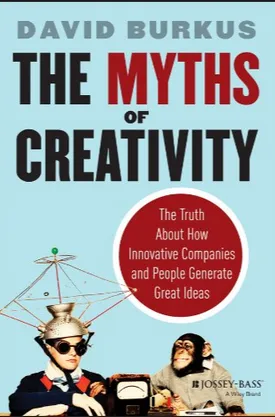The Myths of Creativity: The Truth About How Innovative Companies and People Generate Great Ideas by David Burkus
“The Myths of Creativity: the Truth About How Innovative Companies and People Generate Great Ideas” is a book written by David Burkus that challenges many of the commonly held beliefs about creativity. It provides an honest look at how innovative companies and people actually generate great ideas and dispels many of the myths that exist around creativity.
The book introduces the idea of creative myopia, or the tendency to cling to existing beliefs or ideas that limit our creativity and limit the effectiveness of our ideas. Burkus provides a comprehensive and inspiring look at the real process behind success and innovation. He reviews the latest research on the science of creativity, personality traits of successful innovators, common mistakes made in the pursuit of innovative ideas and much more.
The book puts forward the idea that creativity is not an innate ability but rather something that anyone can cultivate and improve. Burkus identifies four “myths” which act as hindrances to unlocking creative potential. These include: the creative genius myth, the open innovation myth, the isolated imagination myth, and the originality myth. Each myth is then discussed in detail, providing real life examples of how they act as barriers to innovation and success.
One of the most interesting parts of this book is Burkus’ presentation and analysis of the Harvard/MIT Study of High-Return Innovation. This study looked at more than 600 publicly traded companies over a 30 year period and identified which companies had the highest return on investment. The results bucked the idea that creativity needs to be unpredictable and disruptive. Instead, the study found that successful companies have processes in place that ensure success by minimizing uncertainty, encouraging efficiency and enabling intelligent risks.
Burkus also discusses the idea of the “little bets” approach, which focuses on making numerous small projects for rapid iteration and feedback. This approach allows for quick development of ideas and rapid improvement by testing, refining and learning from failures. He concludes the book with a call to arms, urging readers to free themselves from the myths and misconceptions of creativity and learn how to unleash their creative potential.
The Myths of Creativity is an intriguing, thoughtful and thought-provoking book providing an informative and inspiring look at the real process behind success and innovation. It is a must-read for anyone looking to free themselves from limiting beliefs and create those big ideas that make a difference.

